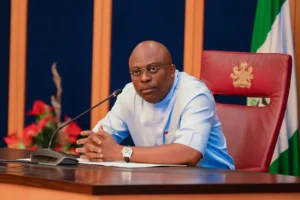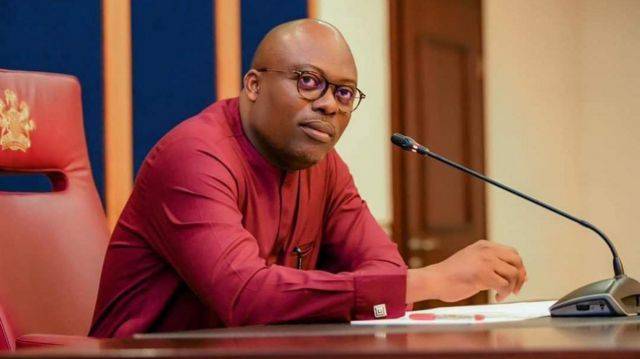In a surprising turn of events, Rivers State Governor Siminalayi Fubara has publicly distanced himself from the Peoples Democratic Party (PDP), the platform on which he was elected just a year ago. Speaking at a meeting with the Senate Committee on Privatisation at the government house in Port Harcourt, Fubara declared that the PDP had failed him and his supporters, prompting a shift to what he described as a “movement” to defend democracy.

The governor’s remarks came during a visit by the committee, led by Senator Orji Kalu. Addressing Senator Abba Moro, a PDP leader present at the meeting, Fubara stated he would no longer adhere to party protocols, citing the party’s perceived failure in Rivers State.
This unexpected announcement follows recent political tensions in Rivers State, including a thwarted attempt to detonate an explosive at the Presidential Hotel in Port Harcourt. Fubara linked this incident to efforts to destabilize the state and potentially justify calls for a state of emergency.
The governor suggested that the failed attack was aimed at high-profile individuals, including members of the visiting Senate committee. He implied that certain forces were working to create chaos in Rivers State to manipulate political outcomes.
Fubara expressed frustration with what he sees as selective application of the law, hinting at powerful individuals who seem to be above legal consequences. He emphasized that his actions were not about personal fights but about defending Rivers State against what he termed “predators” and protecting the interests of its people.
The governor’s decision to break from the PDP marks a significant shift in Rivers State’s political landscape. It raises questions about the future of party politics in the state and the potential emergence of a new political movement under Fubara’s leadership.
This development comes amid ongoing political tensions in Rivers State, which have been simmering since Fubara’s election. The governor’s public break with the PDP could potentially realign political forces in the state and impact its relationship with the national party structure.
Fubara’s comments also touch on broader issues of political loyalty, party dynamics, and the challenges of governance in Nigeria’s complex federal system. His reference to operating as a “movement” rather than within traditional party structures suggests a possible trend towards more personality-driven politics in the state.
As news of Fubara’s declaration spreads, political observers will be keenly watching for reactions from the PDP leadership, both at the state and national levels. The coming weeks may see further clarifications from the governor about the nature of this new “movement” and its implications for governance in Rivers State.
This unfolding situation in Rivers State adds another layer of complexity to Nigeria’s political landscape, potentially influencing party politics and governance models beyond the state’s borders. As events continue to unfold, the impact of Fubara’s bold stance on Rivers State’s political future remains to be seen.




